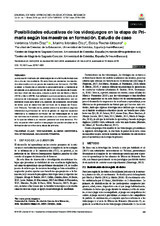Educational Possibilities of Video Games in the Primary Education Stage According to Teachers in Training. A Case Study
Posibilidades educativas de los videojuegos en la etapa de Primaria según los maestros en formación. Estudio de caso
Autor
Marín-Díaz, Verónica
Morales Díaz, Marina
Reche Urbano, Eloísa
Editor
SpringerFecha
2019Materia
VideogamesUniversity Student
Learning
Primary education
Videojuegos
Alumno universitario
Aprendizaje
Educación primaria
METS:
Mostrar el registro METSPREMIS:
Mostrar el registro PREMISMetadatos
Mostrar el registro completo del ítemResumen
Education mediated by video games is a way of working that is increasingly more evident. Along this line we present the resultsobtained from a group of pre-service teachers (N=169), whothrough a quasi-experimental study and the use a questionnairewith 62 items, with a scale to answer to 5 Likert-type, createdfrom Marín and Martín (2014) and Marín (2016), have reflected that previous experience in the utilisation of video games, which are not educational, is a key element to gaining a position of acceptance for their use and for developing the curriculum at the Primary Education level. It has also been possible to conclude the existence of some significant differences regarding gender in some aspects related to the curricular mediation of video games in which males are more inclined towards their use, as well as in regard to their personal relationship with this theme. Therefore, it can be inferred that video games can be used in the education of children at the primary stage. La educación mediada por videojuegos es una forma de trabajo que día a día es más evidente. En esta línea se presentan los resultados alcanzados con un grupo de maestros en formación (N=169), quienes, a través de un estudio cuasi-experimental y mediante el empleo de un cuestionario con 62 ítems con una escala de 5 opciones tipo Likert de respuesta, creado a partir del de Marín y Martín (2014) y Marín (2016), han reflejado que la experiencia previa en el consumo de videojuegos, que no sean de corte educativo, son un elemento clave para tener una posición de aceptación del empleo de estos para el desarrollo del currículo en la etapa de Educación Primaria. También se ha podido concluir la existencia algunas diferencias significativas en torno al género en algunos aspectos referidos a la mediación curricular de los videojuegos en la que los hombres se muestran más proclives a su utilización, así como en lo que se refiere a su relación personal con esta temática. Por ello, se puede inferir que los videojuegos se pueden emplear en la formación de los niños de la etapa de primaria.

